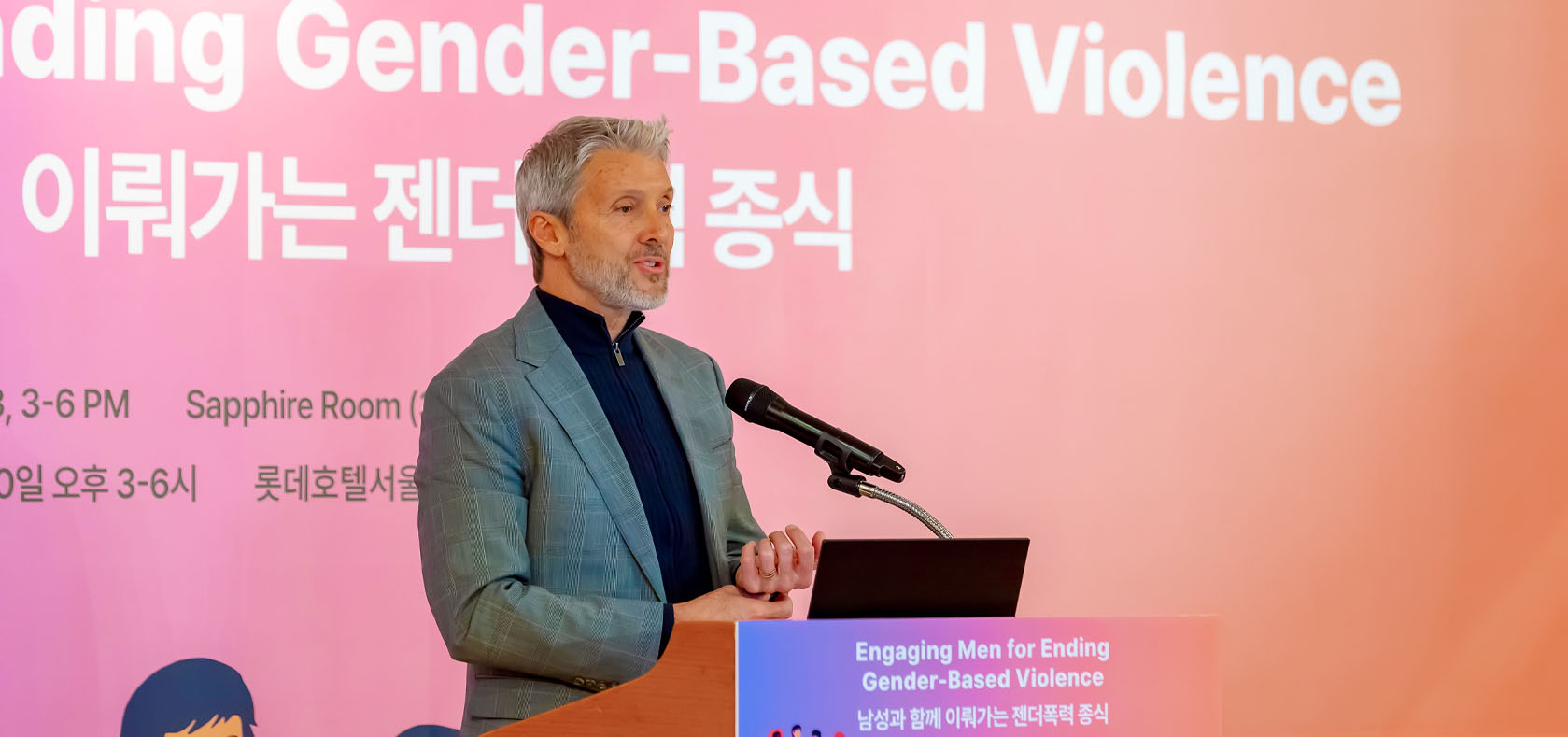In photos
See also:
Date:

Seoul, Republic of Korea — “By calling men into care and connection, we create the pathways for them to be allies in the cause of equality for women and for ending cycles of violence,” emphasized Gary Barker, CEO and President of the Equimundo Center for Masculinities and Social Justice, at the forum “Engaging Men for Ending Gender-Based Violence” hosted by the UN Women Centre of Excellence for Gender Equality in the Republic of Korea on 30 November.
The event was hosted on the occasion of the 16 Days of Activism against Gender-based Violence, a global international campaign to raise awareness and call for the prevention and elimination of violence against women and girls, under the theme, "Invest to Prevent Violence Against Women & Girls," which underscores the imperative to allocate resources to prevent violence from occurring in the first place.
The forum gathered nearly 200 participants, including Kim Hyunsook, Minister of Gender Equality and Family in the Republic of Korea, Alia El-Yassir, Regional Director for UN Women in Asia and the Pacific, and Kim Eun Mee, President of Ewha Womans University and newly appointed UN Women National Goodwill Ambassador for the Republic of Korea.
As a renowned speaker on the topic, Barker discussed how to transform men from potential obstacles to active allies in the pursuit of gender equality. Noting how the conversation surrounding violence is often challenging and may be perceived by men as accusatory, Barker recommended inviting men to have conversations about their own experiences of violence, their perceptions of the world and their identities as men, in order to help them see concrete benefits they can derive from supporting gender equality in their own lives.
“By calling men into care and connection, we create the pathways for them to be allies in the cause of equality for women and for ending cycles of violence ...”
— Gary Barker, CEO and President of the Equimundo Center for Masculinities and Social Justice
In his intervention, Barker highlighted drivers of men’s violence against women. Research findings indicate that boys who witness or experience violence growing up are 3-4 times more likely to use violence against a female partner when they are adults. Other factors mentioned included economic stress such as unemployment, displacement, alcohol use, exposure to online gaming and pornography which objectify women and normalize violence, and perceived impunity (i.e. thinking that they can get away with their acts of violence).
At the same time, Barker stressed that discussing the drivers of violence by men is not about making an excuse for any man’s use of violence against women. “This helps us understand how we break cycles of violence and how we bring men in to see themselves as part of the cause.” He reiterated that men’s violence against women is preventable.
Based on this understanding, Barker outlined three key strategies for effectively engaging men in ending violence: violence prevention, care equity, and initiating conversations with young boys.
Speaking about prevention, Barker explained that men’s violence is often driven by traumatic experiences in childhood, therefore these should be taken into account in conversations about prevention efforts. He also stressed the need to provide help to men for managing their traumas and emotions—such as through counselling, couple-based interventions, parent training, and hotlines.
With regards to care equity, Barker referenced the "State of the World’sFathers 2023: Centering Care in a World in Crisis" and explained “We see in care an antidote, a space where men get to be more than just breadwinners.”
Lastly on engaging with boys, Barker argued that we, as individuals, parents, and societies, need to make collective efforts and investments to help build a more caring manhood, by starting with boys. Citing the work of his work at Equimundo, Barker discussed how we can engage schools and after-school programs with boys and girls to promote healthy manhood and relational learning among young people. "No boy is born violent or born to use violence. We make the violence that some men use. We can all make the loving, caring men the world needs."
See also: